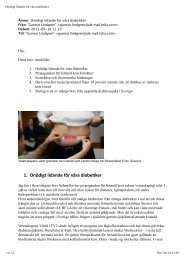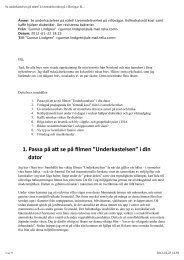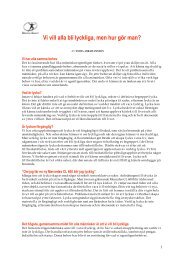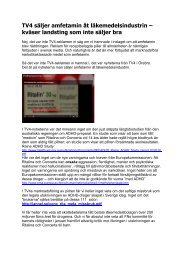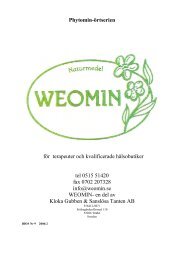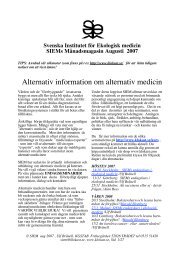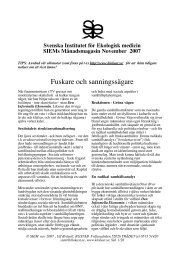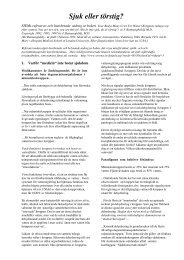Hexan i livsmedel, om barnmat, e.coligåtan, lågkolhydratkost samt ...
Hexan i livsmedel, om barnmat, e.coligåtan, lågkolhydratkost samt ...
Hexan i livsmedel, om barnmat, e.coligåtan, lågkolhydratkost samt ...
Create successful ePaper yourself
Turn your PDF publications into a flip-book with our unique Google optimized e-Paper software.
<strong>Hexan</strong> i <strong>livsmedel</strong>, <strong>om</strong> <strong>barnmat</strong>, e.coligåtan, lågkolhydratkost...<br />
The genetic code reveals the history<br />
When scientists at Germany's Robert Koch Institute decoded the genetic makeup of the O104 strain, they found it to be resistant to all the following classes and c<strong>om</strong>binations of<br />
antibiotics:<br />
• penicillins<br />
• tetracycline<br />
• nalidixic acid<br />
• trimethoprim-sulfamethoxazol<br />
• cephalosporins<br />
• amoxicillin / clavulanic acid<br />
• piperacillin-sulbactam<br />
• piperacillin-tazobactam<br />
In addition, this O104 strain posses an ability to produce special enzymes that give it what might be called "bacteria superpowers" known technically as ESBLs:<br />
"Extended-Spectrum Beta-Lactamases (ESBLs) are enzymes that can be produced by bacteria making them resistant to cephalosporins e.g. cefuroxime, cefotaxime and ceftazidime -<br />
which are the most widely used antibiotics in many hospitals," explains the Health Protection Agency in the UK (http://www.hpa.org.uk/Topics/Infect...).<br />
On top of that, this O104 strain possesses two genes -- TEM-1 and CTX-M-15 -- that "have been making doctors shudder since the 1990s," reports The Guardian<br />
(http://www.guardian.co.uk/c<strong>om</strong>mentis...). And why do they make doctors shudder Because they're so deadly that many people infected with such bacteria experience critical<br />
organ failure and simply die.<br />
Bioengineering a deadly superbug<br />
So how, exactly, does a bacterial strain c<strong>om</strong>e into existence that's resistant to over a dozen antibiotics in eight different drug classes and features two deadly gene mutations plus<br />
ESBL enzyme capabilities<br />
Additional developments on this e.coli outbreak<br />
• 22 fatalities have so far been reported, with 2,153 people now sickened and possibly facing kidney failure.<br />
• An agricultural ministry in Germany said that even though they now know the source of the outbreak is a German sprout farm, they are still not lifting their warnings for people to<br />
avoid eating t<strong>om</strong>atoes and lettuce. In other words, keep the people afraid!<br />
• "The German variant of E coli, known as O104, is a hybrid of the strains that can cause bloody diarrhoea and kidney damage called 'hemolytic uremic syndr<strong>om</strong>e'."<br />
(http://www.independent.ie/world-new...)<br />
• A total of ten European nations have reported outbreaks of this e.coli strain, mostly fr<strong>om</strong> people who had visited northern Germany.<br />
• The following story is in German, and it hints that the e.coli outbreak might have been a terrorist attack (http://www.aerztezeitung.de/medizin...). Yeah, a terrorist attack by the drug<br />
c<strong>om</strong>panies upon innocent people, as usual…<br />
Hela ar3keln se h8p://www.naturalnews.c<strong>om</strong>/032622_ecoli_bioengineering.html<br />
________________________________________<br />
Ny forskning bekräftar att lågkolhydratkost och mer fett inte leder till ökad risk för<br />
hjärt- och kärlsjukd<strong>om</strong> för överviktiga<br />
Från Diabetes in Control.c<strong>om</strong><br />
Low-carb, Higher-fat Diets Add No Arterial Health Risks for Obese People Seeking to Lose Weight<br />
Overweight and obese people looking to drop s<strong>om</strong>e pounds and considering one of the popular low-carbohydrate diets, along with moderate exercise, need not<br />
worry that the higher proportion of fat in such a program c<strong>om</strong>pared to a low-fat, high-carb diet may harm their arteries, suggests a pair of new studies by heart<br />
and vascular researchers at Johns Hopkins....<br />
"Overweight and obese people appear to really have options when choosing a weight-loss program, including a low-carb diet, even if it means eating more fat,"<br />
says the studies' lead investigator exercise physiologist Kerry Stewart, EdD.<br />
Stewart, a professor of medicine and director of clinical and research exercise physiology at the Johns Hopkins University School of Medicine and its Heart and<br />
Vascular Institute, says his team's latest analysis is believed to be the first direct c<strong>om</strong>parison of either kind of diet on the effects to vascular health, using the<br />
real-life context of 46 people trying to lose weight through diet and moderate exercise. The research was pr<strong>om</strong>pted by concerns fr<strong>om</strong> people who wanted to<br />
include one of the low-carb, high-fat diets, such as Atkins, South Beach and Zone, as part of their weight-loss program, but were wary of the diets' higher fat<br />
content.<br />
In the first study, the Hopkins team studied 23 men and w<strong>om</strong>en, weighing on average 218 pounds and participating in a six-month weight-loss program that<br />
consisted of moderate aerobic exercise and lifting weights, plus a diet made up of no more than 30 percent of calories fr<strong>om</strong> carbs, such as pastas, breads and<br />
sugary fruits. As much as 40 percent of their diet was made up of fats c<strong>om</strong>ing fr<strong>om</strong> meat, dairy products and nuts. This low-carb group showed no change after<br />
shedding 10 pounds in two key measures of vascular health: finger tip tests of how fast the inner vessel lining in the arteries in the lower arm relaxes after blood<br />
flow has been constrained and restored in the upper arm (the so-called reactive hyperemia index of endothelial function), and the augmentation index, a<br />
pulse-wave analysis of arterial stiffness.<br />
Low-carb dieters showed no harmful vascular changes, but also on average dropped 10 pounds in 45 days, c<strong>om</strong>pared to an equal number of study participants<br />
rand<strong>om</strong>ly assigned to a low-fat diet. The low-fat group, whose diets consisted of no more than 30 percent fr<strong>om</strong> fat and 55 percent fr<strong>om</strong> carbs, took on average<br />
nearly a month longer, or 70 days, to lose the same amount of weight.<br />
"Our study should help allay the concerns that many people who need to lose weight have about choosing a low-carb diet instead of a low-fat one, and provide<br />
re-assurance that both types of diet are effective at weight loss and that a low-carb approach does not seem to pose any immediate risk to vascular health," says<br />
Stewart. "More people should be considering a low-carb diet as a good option," he adds.<br />
Because the study findings were obtained within three months, Stewart says the effects of eating low-carb, higher-fat diets versus low-fat, high-carb options over a<br />
longer period of time remain unknown.<br />
However, Stewart does contend that an over-emphasis on low-fat diets has likely contributed to the obesity epidemic in the United States by encouraging an<br />
3 av 9 2011-06-11 16.39



